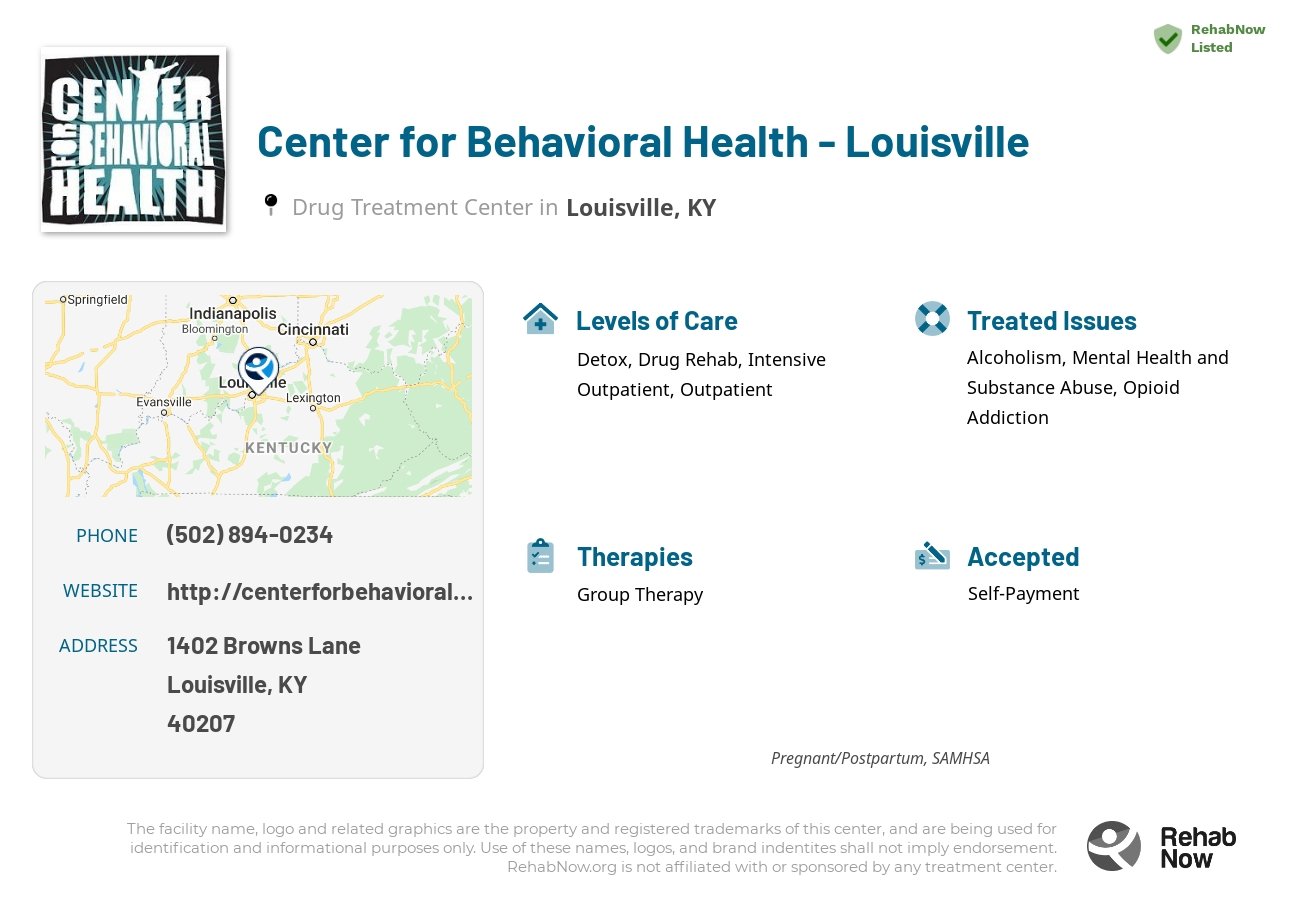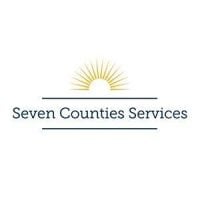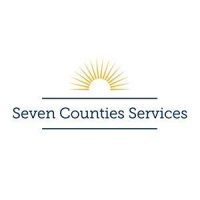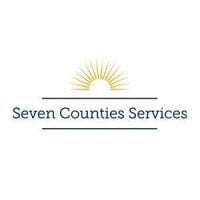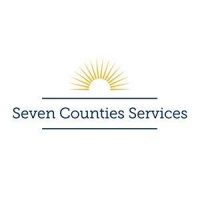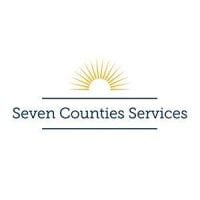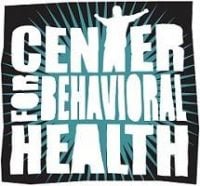
Center for Behavioral Health - Louisville
Drug Rehab Center in Louisville, Kentucky
- Opioid Addiction
- Dual Diagnosis
- Drug Addiction
- Alcoholism
The Center for Behavioral Health - Louisville is a private, non-profit facility in Kentucky that offers specialized treatment and support services for individuals suffering from substance abuse, including medically managed detoxification, intensive outpatient services, medication assisted treatment, and a robust family program.
About Center for Behavioral Health - Louisville in Kentucky
Center for Behavioral Health - Louisville, located in Louisville, Kentucky, is a beacon for adults grappling with addiction or mental health concerns. Emphasizing a person-centered approach, this facility stands out for its comprehensive substance abuse treatment programs and innovative outreach programming.
- Person-Centered Treatment: Individualized plans cater to each person’s needs, ensuring a more targeted and effective recovery journey.
- Comprehensive Support Services: From mental health referrals and case management to social and recreational activities, the range of services supports holistic healing.
- Housing Support for Adults with Mental Illness: Safe living environments coupled with medication monitoring and supportive staff make recovery attainable.
Accredited by the Accreditation Commission for Health Care (ACHC) and licensed as an Opioid Treatment Program, Center for Behavioral Health - Louisville combines accredited care with a wide array of services including medically managed detoxification and intensive outpatient services. Their evidence-based care models and specialized treatment plans set them apart in providing quality addiction care.
Specializing in treating addictions to substances such as opiates (OxyContin, Lortab, Vicodin, Oxycodone, Hydrocodone, and Heroin) and alcohol, the Center utilizes various treatment methods. These include medication-assisted treatment, individual and group counseling, skills building classes, and a range of wellness and recreational activities to support each individual's recovery path.
Genders
Ages
Modality
Additional
Accreditations
SAMHSA
Conditions and Issues Treated
Opioid addiction is when someone becomes addicted to opioids. This can happen quickly due to any opioid use. Opioid withdrawal can be uncomfortable and lead the user to continue using even if they want to quit. It’s best to receive inpatient treatment for detoxification.
Even if a person doesn’t need inpatient treatment, it’s recommended to start rehabilitation or at least some kind of outpatient treatment. This is because the withdrawal symptoms from opioids can be uncomfortable and unpleasant, to the point that a person could end up using again or worse.
Detoxification should be done to break the physical addiction of opioids. This can be done with opioid replacement therapy, medication-assisted therapy, or a more traditional detoxification program. Intensive outpatient treatment is a form of addiction care that allows patients to continue living at home while undergoing treatment. This type of care is appropriate for patients who have been treated in residential treatment programs. Intensive outpatient programs include regular visits to the facility providing therapy, and patients gradually return to their routine life. IOP benefits most when patients have a supportive family member or friend to help them recover.
The first step to getting into an intensive outpatient program is to attend a detoxification facility. Detoxification facilities are designed to remove substances from the body safely. The patient will attend sessions designed to help them understand their addiction and its impact on their lives. While in an intensive outpatient program, therapy sessions are scheduled three to five times per week, with the patient attending no more than two sessions in one day.
Levels of Care Offered
This center offers a variety of custom treatment tailored to individual recovery. Currently available are Detox, Drug Rehab, Intensive Outpatient, Outpatient, with additional therapies available as listed below.
Detox is the process by which toxins are removed from the body. In substance abuse, detox refers to the process of getting rid of the drugs that are already there in the system once the patient stops its further intake. Detox is the initial step in the recovery process. The physiological dependence on the drug over a period can lead to withdrawal symptoms.
Depending on the severity of the symptoms, the detox process is managed either medically or clinically. While Medically assisted detox relies on the usage of specific medicines, clinal or social detox relies on providing emotional and psychological support to the patient.
An intensive outpatient treatment program, or IOP, is set up for those struggling with an addiction to begin the recovery process. However, the patient will not live at the facility during treatment.
IOP involves patients coming in and out of a medical office building regularly to receive therapy and other services while continuing their life outside of these visits.
IOP is a step up from drug detoxification or alcohol detox. However, it’s still considered a phase of recovery rather than the ultimate goal. There are many rehabs and treatment facilities available to patients in need of IOP.
Outpatient treatment consists of counseling and therapy sessions. The outpatient treatment process begins with the addict’s initial detox period, lasting about ten days. Outpatient treatment is used for those who are at moderate risk for “slipping back” into the addiction. It is also used for those who are not currently experiencing any side effects from withdrawal, can handle social pressure, have a stable living environment, and have a good support system.
Therapies & Programs
Group Therapy is employed by drug treatment centers like Center for Behavioral Health - Louisville to provide the recovering addict with a platform to talk about their feelings and experiences. It also provides for an opportunity to learn from other addicts who have successfully overcome their addiction. It is recommended that all group members be recovering addicts for this type of therapy to work.
Payment Options Accepted
For specific insurance or payment methods please contact us.
Center for Behavioral Health Associated Centers
Discover treatment facilities under the same provider.
- Center for Behavioral Health - Bowling Green in Bowling Green, KY
- Center for Behavioral Health - Elizabethtown in Elizabethtown, KY
- Center for Behavioral Health - Frankfort in Frankfort, KY
- Center for Behavioral Health - Louisville in Louisville, KY
- Center for Behavioral Health - Frankfort in Frankfort, KY
Learn More About Center for Behavioral Health Centers
Additional Details
Specifics, location, and helpful extra information.
Louisville, Kentucky 40207 Phone Number(502) 894-0234 Meta DetailsUpdated April 15, 2024
Staff Verified
Center for Behavioral Health - Louisville Patient Reviews
There are no reviews yet. Be the first one to write one.
Louisville, Kentucky Addiction Information
Kentucky ranks among the top ten states for opioid-related overdoses. Most of these are due to heroin, fentanyl, and prescription opioid use. A little over 11% of the Kentucky population abuses alcohol in a given year. More than 15% of Kentucky adults admit to participating in binge drinking every month.
Louisville, Kentucky has a high rate of drug-related deaths. Most drug overdose deaths in Louisville are caused by opioids, such as heroin and fentanyl. Alcohol abuse is also a problem in the city, with binge drinking rates of 19.9% among adults and 11.3% among youths aged 12-20. There are a variety of drug treatment options available in Louisville, Kentucky. Some of the most common include inpatient, outpatient, and detox programs.
Treatment in Nearby Cities
- La Grange, KY (18.1 mi.)
- Martin, KY (163.6 mi.)
- Burkesville, KY (101.0 mi.)
- Georgetown, KY (58.2 mi.)
- Williamstown, KY (64.3 mi.)
Centers near Center for Behavioral Health - Louisville
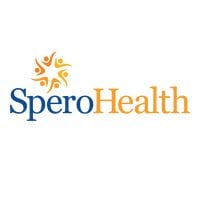


The facility name, logo and brand are the property and registered trademarks of Center for Behavioral Health - Louisville, and are being used for identification and informational purposes only. Use of these names, logos and brands shall not imply endorsement. RehabNow.org is not affiliated with or sponsored by Center for Behavioral Health - Louisville.


